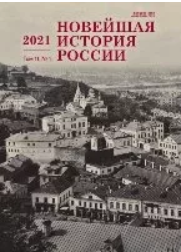Этническая дискриминация при формировании органов государственной власти СССР
Ethnic Discrimination in the Formation of State Bodies of the USSR
Author(s): Boris N. MironovSubject(s): Political history, Social history, Government/Political systems, Politics and society, Pre-WW I & WW I (1900 -1919), Interwar Period (1920 - 1939), Post-War period (1950 - 1989), Inter-Ethnic Relations
Published by: Издательство Исторического факультета СПбГУ
Keywords: Russian Empire; Soviet Union; state apparatus; party apparatus; nomenclature; ethnic; inequality; discrimination;
Summary/Abstract: The level of ethnopolitical inequality is estimated as the ratio of the share of an ethnic group employed in public authorities to the share of this ethnic group among the entire employed population. This indicator can be called the coefficient of ethnopolitical representativeness. In Imperial Russia, almost all major non-Russian ethnic groups had representatives in power structures, although in most cases this was unrepresentative; the number of nominees from an ethnic group did not correspond to its population size. During the entire Soviet period, 1917–1990, there was a steady and systematic decrease in the inequality of ethnic groups in power structures. In 1989, discrimination in the authorities as a whole practically disappeared. The advantages of Russians in forming the Soviet government were minimized; their percentage in government corresponded to their share in the population. In some areas of government, ethnic inequality was leveled at different rates. In the state apparatus, equality in representation was already achieved in 1959. In the apparatus of party and public organizations, there was also a tendency to overcome discrimination, but in this area, by 1990, the percentage of non-Russians remained slightly lower than their share in the population. Minimization of ethnic inequality was a natural consequence, on the one hand, of the national policy of the country’s leadership, on the other — the desire of ethnic elites for equality in political rights.
Journal: Новейшая история России
- Issue Year: 11/2021
- Issue No: 34
- Page Range: 149-173
- Page Count: 25
- Language: Russian

